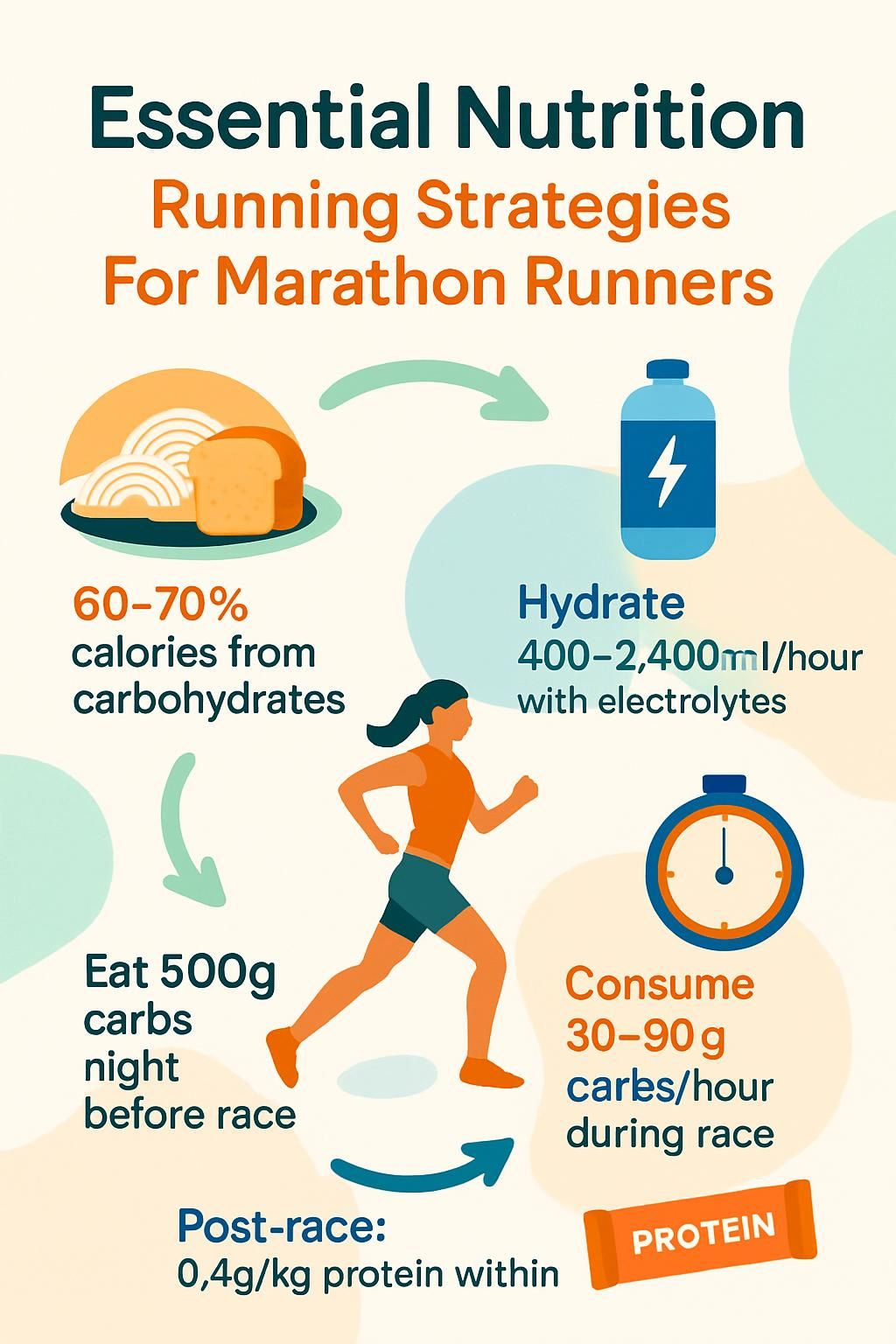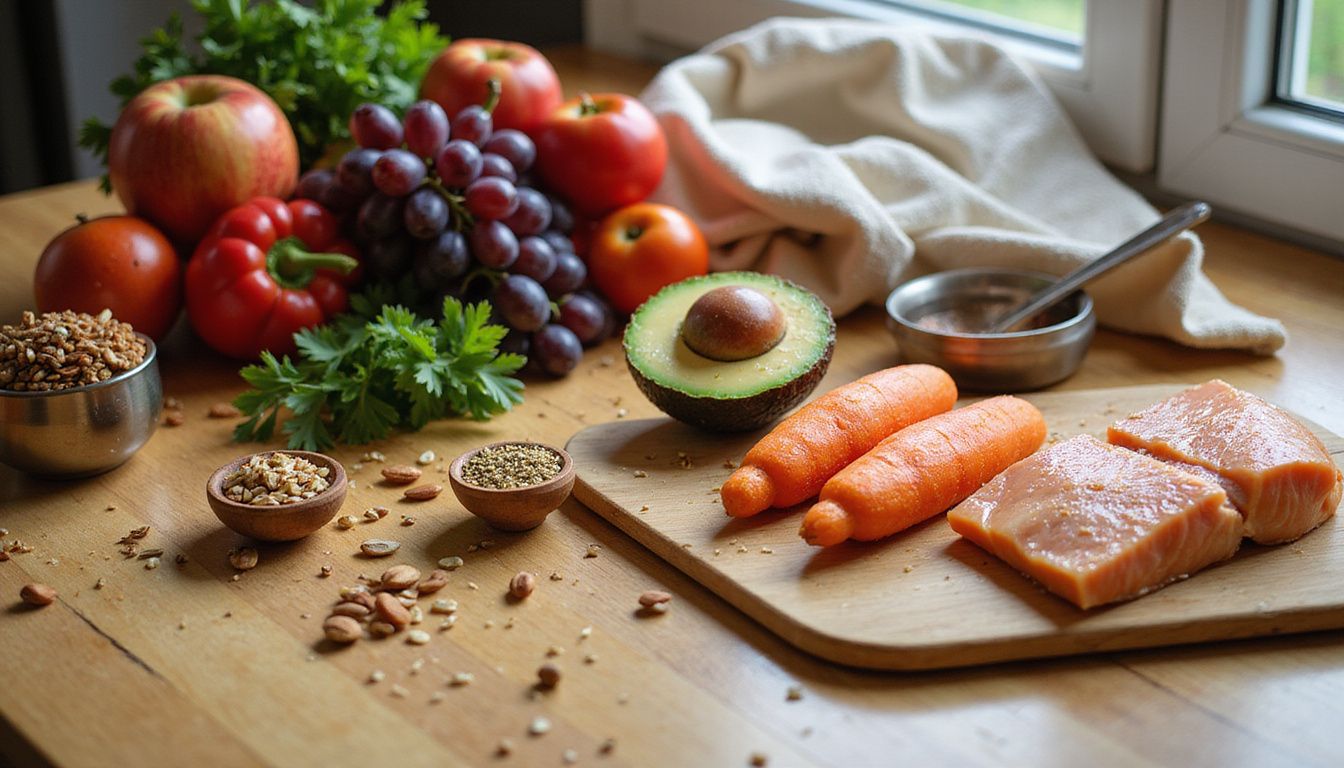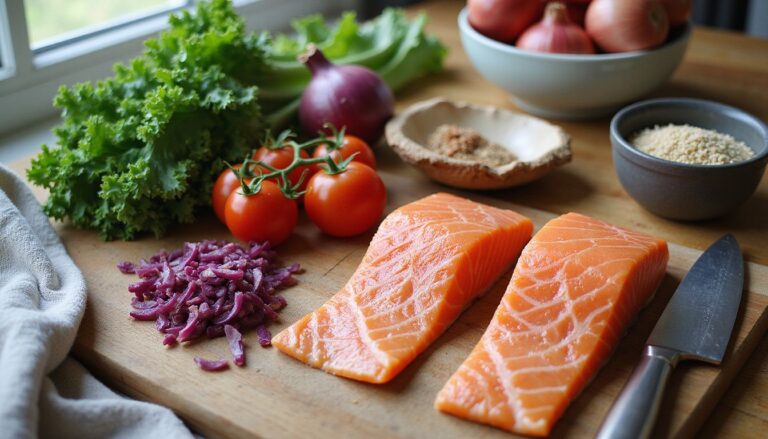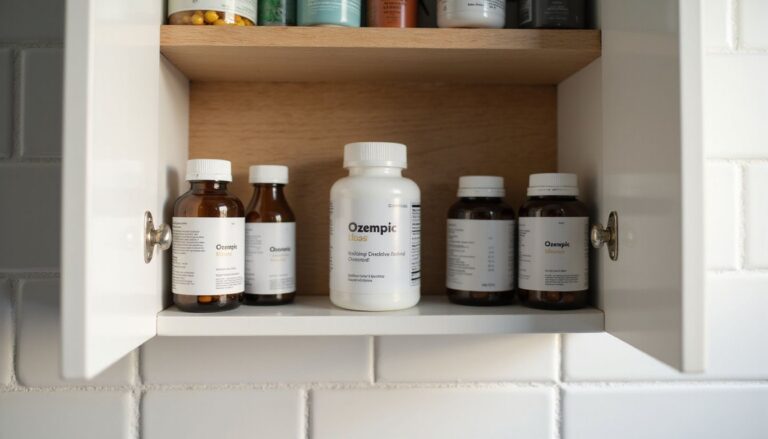Essential Nutrition Running Strategies For Marathon Runners
Our Nutrition Assistant AI Suite will transform your body. You will lose fat, get toned, and build muscle. Gain confidence and optimal health.
Finding the right fuel for long runs can feel confusing. With a few clear nutrition tips, you can power your training and show up strong on race day. Runners need smart carbohydrates, lean protein, healthy fats, and steady hydration to support marathon training and recovery.
This guide gives you simple, science-backed advice, plus common mistakes to avoid. Use it to plan meals, test gels, and dial in hydration before your next marathon.
Key Takeaways
- Aim for about 60–70% of calories from carbohydrates, 15–20% from lean protein, and 15–20% from healthy fats to support endurance.
- Hydrate to match sweat loss, often 400–2,400 ml per hour, and replace about 700–900 mg sodium each hour using electrolyte drinks or salt tabs to lower hyponatremia risk.
- Eat a carb-focused dinner the night before, then a low fat breakfast with at least 30–60 g carbs about 1–3 hours before the start.
- During the race, use gels or drinks that supply 30–90 g carbs per hour, and train your gut with these choices well before race day.
- Start recovery within one hour with carbohydrate plus protein, about 0.4 g protein per kg body weight per meal, and include potassium-rich fluids.

Key Nutritional Strategies for Marathon Runners

Good nutrition fuels training, supports recovery, and protects health through heavy mileage. What you eat sets the pace for how you feel and finish.
Why is balanced eating important for marathon performance?
A balanced plate gives your body easy access to fuel. Carbohydrates, your primary fuel source, should provide about 60 to 70 percent of daily calories. Your body turns carbs into glucose, then stores it as glycogen in muscles and the liver for quick energy.
Protein should make up about 15 to 20 percent of calories to support muscle repair after hard efforts. Healthy fats like olive oil, avocado, nuts, and seeds supply longer-lasting energy and help absorb fat-soluble vitamins.
Micronutrients matter too. Calcium and vitamin D support bone health. Iron helps move oxygen in the blood, which is critical for endurance. B vitamins help turn food into energy. Vitamin C and zinc support your immune system during heavy training.
“You cannot out-train poor nutrition if you want to finish strong.”
How does poor nutrition affect marathon times?
Low carbohydrate intake can lead to “hitting the wall” when glycogen runs low near mile 18 to 20. Without enough fuel, pace drops and fatigue rises. Iron deficiency can slow times because less oxygen reaches working muscles.
Dehydration increases heart rate and core temperature, which makes running feel harder. Losing as little as 2 percent of body weight in fluid reduces endurance. Skipping recovery, especially protein and electrolytes, slows muscle repair and delays glycogen refilling.
I once skipped my pre-run meal on a long training day. My pace crashed at mile 16, and the finish felt harder than it should have been. A solid evening meal and a simple breakfast can set up a better race.
Evening and Morning Nutrition Pre-Marathon
What you eat the night before and morning of the race can decide how you feel at the start line.
What should I eat the night before a marathon?
Choose a carb-heavy dinner with simple and complex sources like rice, pasta, potatoes, or bread. The goal is to top off glycogen stores, often about 500 grams of carbohydrate across the day. Add a modest serving of lean protein such as chicken, tofu, eggs, or fish. Pick cooked vegetables that are easy to digest.
Avoid deep-fried items, high fat meals, heavy dairy, and very spicy foods. Limit high fiber choices like large salads, whole grains, and cruciferous vegetables to reduce bloating. Drink water through the evening, and consider electrolytes to support fluid balance. A calm evening helps you rest and store energy.
What are good breakfast options on race day morning?
Pick easy, familiar foods that are simple to digest. Good options include bananas, applesauce, white toast with honey, plain cereal with low fat milk or a milk alternative, pretzels, or boiled potatoes. Aim for 30–60 grams of carbohydrate in the hour before the start if you tolerate it well.
Combine carbs with a small amount of protein, such as oatmeal with a little nut butter or toast with peanut butter. Limit high fat foods. Use caffeine only if you have trained with it and it does not upset your stomach.
“If nerves make eating hard, use a small carb snack like crackers or applesauce in the last 30 minutes.”
When is the best time to eat before the marathon starts?
Eat a full meal 2 to 3 hours before the gun. Choose low fat, low fiber carbs like oatmeal with banana or a bagel with honey. This timing helps digestion and gives available energy at the start.
If there is a longer gap, take a small carb snack about 30 minutes before you begin. Sip fluids in the hours before the race, but avoid large volumes right before the start. Begin adding electrolytes the day before to support sodium balance as sweating increases.
In-Race Nutritional Tactics
Think of race fueling as cruise control. Small, steady refills keep your engine running.
How do glucose supplements help sustain energy during marathons?
Glucose from gels, drinks, or chews supplies fast fuel as glycogen falls during long efforts. Most runners benefit from 30 to 60 grams of carbohydrate per hour in events longer than 90 minutes. In very long races, trained athletes may reach 60–90 grams per hour if tolerated, often using a mix of glucose and fructose for better absorption.
Test every product in training. A gut trained in practice is far less likely to complain on race day.
What is the best way to use energy gels and hydration formulas?
Gels and hydration mixes work best with a plan. Use these steps to stay steady and avoid stomach issues.
- Begin fueling within the first 30 minutes to prevent early dips in energy.
- Take gels slowly over 4 to 5 minutes to ease absorption.
- Use a gel every 30–40 minutes during long efforts.
- Pair gels with drinks that provide about 250–300 mg sodium per serving.
- Target 700–900 mg sodium each hour from drinks, chews, or salt tabs, adjusting for heat and sweat rate.
- Track sweat loss. Many runners lose 400–2,400 ml per hour, so practice amount and timing.
- Test all products in training to reduce GI surprises on race day.
- Drink water with every gel to aid digestion.
- If energy still dips, add higher carb foods like bananas or soft pretzels.
In my first marathon, I tested different flavors during long runs. That practice showed me which gels sat well and which ones caused cramps under stress.
How can I maintain electrolyte balance and stay hydrated while running?
Even small fluid losses can impair focus and pace. A simple plan helps you protect performance.
- Use drinks with sodium rather than plain water to lower hyponatremia risk.
- Pick mixes with about 250–300 mg sodium per serving to match common sweat losses.
- Replace about 700–900 mg sodium each hour, more in heavy sweaters or hot weather.
- Start sipping electrolyte drinks about 24 hours before the race.
- Learn your sweat rate in training. Many athletes lose 400–2,400 ml per hour.
- Carry gels or chews that include carbs plus electrolytes like potassium and magnesium.
- Weigh yourself before and after key workouts to estimate losses and adjust intake.
- Rely on trial and error in practice to find what your gut tolerates best.
- Skip large amounts of caffeinated soda near or during the race if it worsens dehydration.
- Favor steady sips at aid stations over big chugs to keep balance mile after mile.
These tactics support stable energy, reduce cramping, and protect race pace from start to finish.
What strategies reduce digestive issues during the race?
GI distress can undo months of work. Reduce the risk with clear choices and timing.
- Avoid high fat and deep-fried meals the night before or race morning.
- Limit high fiber foods close to the start to reduce gas and cramping.
- Use easy carbs, like bananas, applesauce, or white bread, 1–3 hours before the gun.
- Test every pre-race meal and drink during long training runs.
- Take gels over several minutes instead of swallowing them all at once.
- Cut back on caffeine if it speeds up your gut.
- Drink small, regular amounts rather than large volumes at one time.
- Stick with familiar electrolyte products that worked in training.
- If you have a sensitive stomach, avoid any new foods or drinks on race day.
Recovery Nutrition After the Marathon
Recovery starts the moment you finish. Early nutrition shortens soreness and speeds your next run.
How can I restore glycogen levels after the race?
Within one hour, have a snack or meal that combines carbs and protein. This timing supports faster glycogen refilling and muscle repair. Simple options include peanut butter with banana, an egg on toast, a deli sandwich, pasta with a protein source, a veggie burger, or a fruit smoothie.
A citrus-based smoothie can supply carbohydrate and potassium, which supports fluid balance. If your appetite is low, take a small carb and protein snack to start recovery while your stomach settles.
What role does protein play in muscle recovery post-marathon?
Hard running creates tiny muscle tears. Protein provides amino acids, the building blocks that repair those tissues. Aim for about 0.4 grams of protein per kilogram of body weight in each serving, repeated 4 to 6 times in the day after the race.
Animal foods like eggs, dairy, fish, and meat provide complete amino acids. Plant-based athletes can combine foods, such as grains with legumes, to cover all essentials. Pair protein with carbs to refill glycogen and support muscle rebuilding at the same time.
How do I properly rehydrate and replace lost electrolytes?
Rehydration is as important as refueling. Replace fluid and minerals in a measured way to avoid both dehydration and dilution of sodium in the blood.
- Start rehydrating within the first hour after finishing.
- Choose drinks that include sodium and potassium, such as sports drinks or broths.
- Replace sodium losses carefully. Sweat can contain high sodium, especially in hot races.
- Use products with about 250–300 mg sodium per serving to support nerve and muscle function.
- Avoid overusing plain water, which can lower blood sodium.
- Check urine color. Light yellow often signals good progress.
- Use a mix of fluids, like sports drinks and soups, to restore water and minerals.
- Get potassium from foods like bananas or potatoes as part of your post-race snack.
- Adjust strategy to your weight, sweat rate, and climate.
- Seek advice from a registered dietitian for a personal plan if you struggle.
Essential Nutrients for Optimal Marathon Performance
Different nutrients play different roles. Cover the essentials to run strong and recover well.
Why are carbohydrates important for endurance energy?
Carbohydrates power long-distance running. Your body breaks them into glucose and stores the extra as glycogen in muscles and the liver. Glycogen supports 60 to 90 minutes of moderate to hard running. Low intake raises your risk of fatigue and slower times.
Most runners need 60 to 70 percent of calories from carbs, leaning on simple and complex sources. Before a marathon, aim to fully load glycogen, often around 500 grams of carbs across the day. During efforts longer than 90 minutes, target 30–60 grams per hour, increasing to 60–90 grams per hour if you can tolerate it.
How do proteins aid muscle repair and maintenance?
Protein helps repair muscle damage from training and racing. Many runners do well with 0.4 grams per kilogram of body weight per serving, 4 to 6 times per day. Animal sources offer complete amino acids. Plant sources work well when combined to cover all essentials.
After long runs, I added Greek yogurt or eggs within an hour. Soreness dropped the next day, and weekly mileage felt smoother.
What fats are vital for longer energy reserves?
Healthy unsaturated fats, such as those from oils, avocados, nuts, and seeds, support hormone health and longer energy. Aim for 15 to 20 percent of calories from fat. Oily fish provide omega-3 fats that may help lower inflammation from training.
Keep portions moderate before runs to reduce stomach upset. Limit saturated fats, which may raise LDL cholesterol over time.
Which vitamins and minerals are key for marathon runners?
Calcium and vitamin D help protect bones under impact. Iron supports oxygen delivery, so include iron-rich foods and pair them with vitamin C to boost absorption. B vitamins aid energy metabolism. Magnesium and calcium support muscle contraction. Zinc and vitamin C help immune function during high training loads.
Electrolytes like sodium and potassium regulate hydration and nerve signals. If you follow a vegan or vegetarian diet, watch iron and vitamin B12 closely and consider testing with a clinician if you feel unusually tired.
Marathon Hydration Techniques
Hydration is a performance tool. Plan it as carefully as pacing.
How much water should I drink during training and on race day?
Arrive well hydrated, then replace fluids to match sweat losses. Many runners lose 400 to 2,400 ml per hour, with about 1,200 ml as a common average. Drink small amounts at regular intervals rather than waiting for thirst.
Use urine color as a quick guide. Pale yellow usually means good hydration, dark yellow suggests you need more. Avoid overhydration. Pair fluids with electrolytes, especially sodium, to lower the risk of hyponatremia.
For long runs, consider sports drinks that add both fluids and carbs, about 30 grams in two cups, to help meet energy needs.
Why is sodium and electrolyte intake important?
Sweat removes sodium, potassium, and magnesium that your body needs to move fluids and fire muscles. Many products provide 250 to 300 mg sodium per serving. Some runners need 700 to 900 mg sodium per hour in long, hot races. Start building electrolyte intake a day before racing to support balance.
Sodium helps maintain blood volume and nerve signals. Potassium and magnesium also support muscle function and may lower cramp risk.
How can I avoid dehydration and overhydration?
Both extremes can damage performance and health. These steps help you steer between them.
- Use fluids with sodium and potassium the day before the race.
- Watch urine color. Pale yellow is a practical target. Clear urine can signal overhydration.
- Drink small amounts every 15–20 minutes during runs.
- Weigh yourself before and after long sessions to estimate sweat rate.
- Do not rely on plain water alone in long events. Add electrolytes.
- Practice hydration in different weather and with different diets if relevant.
- Avoid waiting for strong thirst signals, which can come late.
These habits support steady energy and clear thinking in training and racing.
Tailoring Your Marathon Nutrition Plan
Your best plan fits your body, your training, and your climate. Test early and tweak often.
How do I calculate my personal energy needs?
Use a simple approach to estimate intake, then adjust based on how you feel and perform.
- Estimate your Basal Metabolic Rate using a standard formula to find calories burned at rest.
- Multiply by an activity factor that reflects your training load.
- Estimate running burn near 100 calories per mile, then adjust for body weight and pace.
- Raise carbohydrate to about 60–70% of calories as mileage grows.
- Include 15–20% of calories from lean protein, spreading intake across the day.
- Add healthy fats for 15–20% of calories to support longer energy and hormones.
- Track hunger and energy. Strong hunger soon after runs can signal underfueling.
- Adjust for heat, altitude, age, and sex, which change fluid and fuel needs.
- Watch sudden weight drops in high-mileage weeks, which may signal low intake or dehydration.
- Test your plan during long runs and note what helps pace and comfort.
Matching intake to workload protects training quality and mood while reducing injury risk.
How should I test and adjust foods and drinks during training runs?
Practice your full routine on long training days. Write down what you ate, when you took it, and how you felt.
- Try different gels, chews, drinks, or simple foods during several long runs.
- Log energy, stomach comfort, and pace to spot patterns.
- Rotate carb sources, like chews or bananas, to find what sits best.
- Use small amounts of fat or protein only if you have tested them well.
- Eat pre-run meals 2–3 hours before, and test small snacks 30 minutes before.
- On hot days, use fluids that contain sodium to better match sweat losses.
- Remove any item that caused cramps, bloating, or sudden crashes.
- Record timing, weather, and any symptoms to guide adjustments.
- Experiment with low sugar sports drinks if you struggle with sweetness.
- Share your log with a coach or dietitian for targeted feedback.
- Repeat the plan that worked during training for a calmer race morning.
How can I adapt my nutrition plan to different climate conditions?
In heat or humidity, sweat rates climb. Increase fluids and electrolytes, and begin sodium earlier. Choose easy-to-digest, higher carb meals to reduce gut stress.
In cold weather, thirst can drop, but you still lose fluid through sweat and breathing. Carry drinks and maintain regular sips. Longer or harsher conditions may require more total calories.
Practice in similar weather when you can. Those notes will guide race day choices.
Next, see which foods to avoid as you prepare for the big day.
Foods Marathon Runners Should Avoid
Some choices raise GI risk or cause energy swings that slow you down.
Why avoid high-fat and deep-fried foods before running?
High fat meals digest slowly and can sit in the stomach during a run. Your body needs quick fuel from carbs before hard efforts. Heavy, fried foods raise the chance of nausea or cramps and can leave you feeling sluggish.
Healthy fats still matter in your diet. Save larger portions for times away from key runs or race morning.
What foods commonly cause digestive problems for runners?
Greasy foods like fries or burgers slow digestion. Beans, lentils, and very high fiber grains can trigger gas or cramping close to start time. Some dairy products bother runners who are lactose intolerant. Spicy foods are risky for many people pre-race.
Sugar alcohols in gum or bars can cause gas and bloating. Carbonated drinks add air to the stomach and may increase cramping.
How do certain snacks cause quick sugar crashes?
Candy, pastries, and sweet drinks can spike blood sugar. Insulin then lowers it quickly, which can leave you tired and unfocused mid-run. High fat snacks can slow digestion and make the crash worse.
For steadier energy, lean on complex carbohydrates and simple, low fat pre-run choices.
Supplement Use for Marathon Runners
Supplements can fill gaps, but whole foods should carry most of the load.
When should I take supplements and why?
Consider supplements if testing or a clinician has found a deficiency, or your diet cannot meet needs during heavy training. Iron and vitamin B12 can be low in some athletes. Low iron raises fatigue and hurts performance. A multivitamin may help if intake is limited for a period, but it should not replace a balanced diet.
Work with a registered dietitian to assess needs with food logs and lab work if needed. Use targeted supplements with a clear purpose, not as a blanket fix.
What are common supplements for marathon runners like BCAAs and vitamins?
Some supplements can support health or recovery when used with a strong diet.
- Branched-chain amino acids may reduce muscle soreness after long efforts.
- Multivitamins can cover small gaps during high training loads.
- Calcium, paired with vitamin D, supports bone health under impact.
- Vitamin D helps with calcium absorption and may be low with limited sun.
- Iron supports oxygen delivery, especially important for many women runners.
- Electrolyte products, including sodium, potassium, and magnesium, aid hydration and nerve function.
- Omega-3 fats may help manage training-related inflammation.
- Protein powders offer a quick option post-run when food is not handy.
- Glucose gels provide rapid energy during long runs without heavy chewing.
Common Nutritional Myths for Marathon Running
Facts beat fads. Use practices that hold up in training and racing.
What is the truth about carbohydrate loading?
Carb loading is useful before long races. In the 24 to 48 hours before the marathon, focus on higher carbohydrate meals to fill glycogen stores. Many runners aim for about 500 grams of carbohydrate across the day. During the race, plan for 30–60 grams per hour, rising toward 60–90 grams per hour in longer events if tolerated.
How much protein do long-distance runners really need and when?
Protein supports recovery and is not only for strength athletes. Many runners do well with 15 to 20 percent of calories from protein. A practical target is 0.4 grams per kilogram of body weight per serving, eaten 4 to 6 times each day.
Focus on high quality options. Eat a protein and carbohydrate combo soon after runs to speed repair and refill glycogen.
Guidance for First-Time Marathon Runners
Good habits build confidence. Start simple, then personalize your plan over time.
How can beginners develop effective nutrition habits during training?
Base meals around 60–70% carbs with fruits, vegetables, grains, and starches. Include lean proteins and healthy fats at each meal. Eat a full meal 2 to 3 hours before training. Oats with banana and yogurt is a classic choice.
Female runners should include calcium sources and iron-rich foods to support bone health and oxygen transport. Practice hydration before, during, and after runs. Test fueling options like rice cakes or gels to see what your stomach tolerates. Keep a simple journal to track what worked.
What common nutritional mistakes should I avoid on race day?
- Skipping breakfast, which often leads to early fatigue.
- Choosing spicy, deep-fried, or high fat foods pre-race, which can upset the stomach.
- Eating high fiber meals close to the start, which can cause bathroom stops.
- Drinking too little, which causes dehydration and slower pace.
- Drinking too much plain water without electrolytes, which raises hyponatremia risk.
- Using new gels or drinks you never tested in training.
- Starting low carb and arriving at the start with low glycogen.
- Skipping post-race carbs and protein, which delays recovery.
- Ignoring personal sweat rate and weather when planning fluids.
- Grabbing very sugary snacks right before the start, which can cause a later crash.
Plan your routine, stick to tested foods, and keep your strategy simple under stress.
Conclusion
Marathon success depends on steady fuel, smart hydration, and timely recovery. Focus on carbs for energy, lean protein for muscle repair, and healthy fats for longer reserves. Add key vitamins and minerals like iron, calcium, vitamin D, and electrolytes to support training demands.
Practice your plan in training, including gels, sports drinks, and breakfast timing. Small adjustments can prevent GI issues and late-race slowdowns. For individual needs or medical conditions, consult a registered dietitian or healthcare professional. This article is for education and does not replace medical advice.
Selected sources: American College of Sports Medicine Position Stands on Nutrition and Hydration; International Olympic Committee consensus statements on sports nutrition; research by Burke and colleagues on carbohydrate intake for endurance events; and peer-reviewed guidance on exercise-associated hyponatremia.
FAQs
1. What are the most important nutrition strategies for marathon runners?
Marathoners need to focus on carbohydrate loading, balanced hydration, and proper electrolyte intake. Consuming 7 to 10 grams of carbohydrates per kilogram of body weight daily in the days before a race can help maximize glycogen stores (Burke et al., 2011). Drinking fluids with sodium helps maintain fluid balance during long runs.
2. How should I fuel during a marathon?
Runners benefit from consuming 30 to 60 grams of carbohydrates each hour after the first hour of running (Jeukendrup, 2014). Sports drinks or energy gels provide quick energy and replace lost electrolytes. Small sips every fifteen minutes support steady performance.
3. What foods should I avoid before race day?
Avoid high-fiber foods like beans or raw vegetables within twenty-four hours before racing; these may cause stomach discomfort. High-fat meals can slow digestion and lead to sluggishness during your run.
4. Can you share an example of how nutrition planning helped a runner succeed?
A distance athlete once struggled with fatigue late in races until she started tracking her carbohydrate intake using food logs and adjusted her pre-race meals based on sports dietitian advice. Her finish times improved as she maintained stable blood sugar throughout events.
Summary: Carbohydrate loading, regular fueling during exercise, careful food choices before competition, and personalized plans all play key roles in successful marathon nutrition strategies for runners seeking peak performance outcomes.







